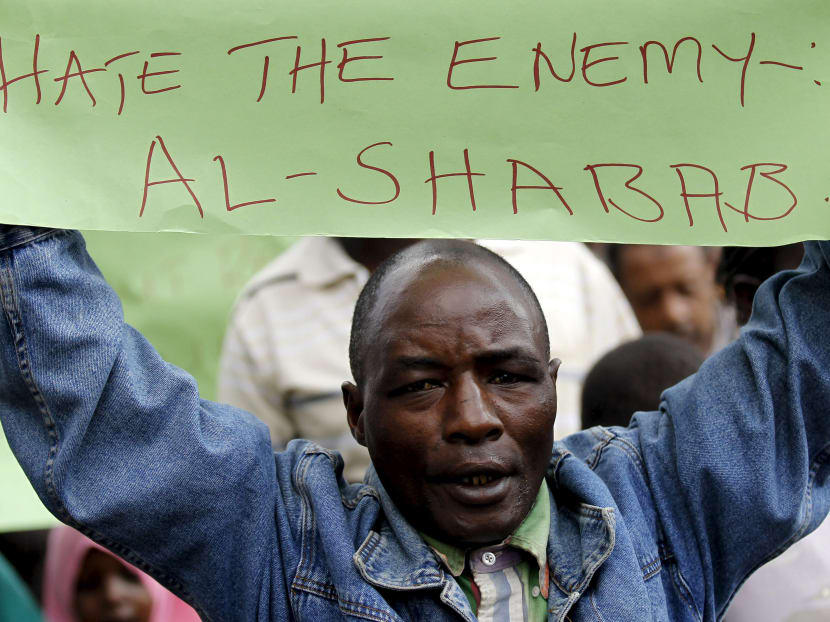Kenya struggles over best response to attack
NAIROBI (KENYA) – Opposition leaders demanded yesterday (April 8) that Kenya pull its troops out of Somalia as soon as possible and accused the president of trying to emasculate the judiciary, one of Kenya's few public institutions that is not considered hopelessly corrupt, in the wake of a terrorist attack last week that killed 142 students.

A man participates in a protest against the gunmen attack at the Garissa University, at the Eastleigh neighbourhood in Kenya's capital Nairobi April 8, 2015. Photo: Reuters
NAIROBI (KENYA) – Opposition leaders demanded yesterday (April 8) that Kenya pull its troops out of Somalia as soon as possible and accused the president of trying to emasculate the judiciary, one of Kenya's few public institutions that is not considered hopelessly corrupt, in the wake of a terrorist attack last week that killed 142 students.
Kenya's president, Mr Uhuru Kenyatta, is hastily trying to tighten security across the county and has called for 10,000 police recruits to report for duty, in clear defiance of a court order last year that found the recruitment process so riddled with corruption that it had to be started afresh.
Kenya is clearly struggling with how to respond to the gruesome attack carried out by a handful of militants from the Islamist group al-Shabab, based in Somalia.
Government officials said yesterday that the police had discovered a man hiding among the dead bodies who might have been an additional attacker. The Kenyan authorities initially said that four gunmen killed the students at a university on Kenya's eastern frontier and that all the gunmen were killed by Kenyan commandos at the end of a protracted siege.
But yesterday, two officials who said they were not allowed to publicly discuss a continuing investigation said that no students at the university recognised a man who emerged from the corpses. The police arrested the man, a Tanzanian, shortly after the killings, and he remains in custody.
Kenya has also moved against dozens of businesses and organizations that it believes are connected to al-Shabab. On Wednesday, the government froze scores of bank accounts, including some used by nonprofit organisations that promote human rights. The government also shut down Somali money transfer agents operating out of Nairobi, Kenya's capital.
Millions of Somalis depend on money transfers, since Somalia's banking system, like much of the country, lies in ruins after more than 20 years of civil war.
Intellectuals and opposition figures are increasingly concerned that Kenyatta is using the massacre at the university as a pretext to consolidate control. Each day, more organisations are coming forward to criticise his directive to mobilise the 10,000 police recruits who the courts had ruled were improperly hired.
In Kenya, police corruption starts even before officers are hired. Analysts say corruption is so stubbornly ingrained that it begins with young men raising money from their villages, usually around US$2,000 (S$2716), to bribe recruitment officials just to get the job.
The young officers, who make only US$200 a month, then have a stiff debt to repay. Hapless motorists and passers-by become their quarry. Superiors in the police department are widely believed to demand a cut, sustaining a system in which countless men and women in uniform are on the take.
By comparison, Kenya's courts are considered relatively clean. They are one of the strongest pillars of the country's young democracy, Western diplomats say, which is why human rights observers and others are so concerned about Kenyatta's recent directive. In an attempt to appear responsive to terrorism, he seems to be setting up a showdown between himself and one of the most respected institutions in the country.
"You can't really defy a court order and say you're a president ruling through the rule of law," said Raila Odinga, a former prime minister and an opposition leader who was also among those calling for Kenyan troops to be withdrawn from Somalia. "It's the height of impunity."
The Independent Policing Oversight Authority, a public body entrusted with monitoring the police, is threatening to sue the police chief if he follows Kenyatta's directive, ignores the court order and begins to train the 10,000 recruits.
Manoah Esipisu, a government spokesman, said Wednesday that the judiciary had acted too slowly in resolving the police recruitment problems and that Kenya was now in "a perilous situation that requires expeditious action."
When asked who was the ultimate authority in the land, Kenyatta or the country's constitution, Esipisu said, "That's a debate we don't want to get into."
He said, "Yes, yes, I know," when read the section of the constitution that said "national security shall be pursued in compliance with the law."
"But," he added wryly, "I also know the constitution wouldn't survive in anarchy."
Kenya has not descended into anarchy. Since the attack, business has been normal in Nairobi, and Kenyans seem almost to be getting used to such grim news. An attack in 2013 at the Westgate Mall, in which al-Shabab militants killed scores of shoppers, dominated the national mood for weeks. In contrast, news from the university attack has already begun to slide off the front pages. On Wednesday, one of the leading papers ran a front-page article on traffic.
But there is little doubt that al-Shabab has wounded this country. Kenya's currency continued to fall against the dollar Wednesday, and tourism operators were pessimistic about the summer safari season, saying al-Shabab had probably scared off thousands of well-heeled visitors. THE NEW YORK TIMES






